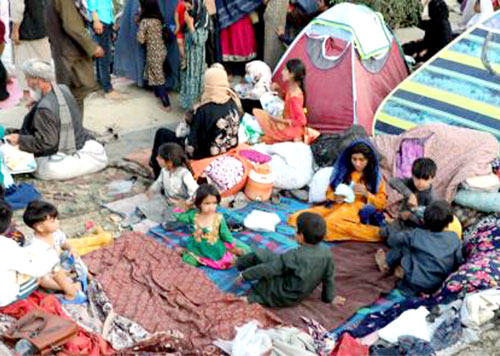Britain on Wednesday pledged an additional 286 million pounds ($374 million) for life-saving food and other aid in Afghanistan, a day ahead of an international conference seeking $4.4 billion for addressing the humanitarian crisis in Afghanistan.
“The UK is rallying countries in support of the Afghan people and helping lead the way in providing life-sustaining food, shelter and medical supplies. Together with allies and partners, we can do more and will do more to help Afghanistan,” Britain’s Foreign Secretary Liz Truss said in announcing the pledge that matches its latest annual commitment.
The UN humanitarian appeal, the largest ever launched for a single country, is only 13% funded, UN spokesperson Jens Laerke said ahead of Thursday’s pledging conference. Laerke said the funds go directly to aid agencies implementing projects on the ground and none is channeled through the Islamic Emirate.
Roughly 23 million people are experiencing acute hunger and 95% of Afghans are not eating enough, while 10 million children are in urgent need of aid to survive, according to the United Nations, which will co-host the talks with Britain.
The online pledging event will be held on Thursday at the ministerial level. It will be convened by the UN Secretary General Antonio Guterres and will be co-hosted by Qatar, UK and Germany, the UN Office for the Coordination of Humanitarian Affairs (OCHA) said.
“While Afghanistan has long had persistent humanitarian needs due to years of conflict and recurring drought, the current situation is unparalleled, with more than 24.4 million people requiring humanitarian assistance to survive. Food security levels have plunged at a rate not seen elsewhere in such a short period, with half the population facing acute hunger, including 9 million people in emergency food insecurity – the highest number globally. Malnutrition is on the rise, and livelihoods have been destroyed,” OCHA said.
Meanwhile, the number of people in Afghanistan who cannot afford food and other essentials has doubled since the Islamic Emirate takeover of the country in August 2021 as unemployment rises and wages fall, a World Bank survey showed.
The Afghanistan Welfare Survey, conducted by phone and covering the October-December 2021 period, found that 70% of respondents said their households were unable to cover basic food and non-food needs, up from 35% in May 2021.
The share of Afghan households switching to lower-quality or less expensive food rose to 85% from 56% in the July-August 2021 period, it found. Nearly half of households also reported a decline in the number of meals consumed each day, up from around a quarter in July-August 2021.
The World Bank attributed the sharp increase in poverty to overall economic conditions rather than to “specific actions introduced by the interim administration”, citing in particular a decline in public sector jobs.
The Islamic Emirate authorities still lack international recognition seven months after regaining power as the last US-led international troops departed, ending 20 years of war.
Donors cut financial aid constituting more than 70% of government expenditures and about $9 billion in Afghan central bank assets were frozen.
The United Nations has previously warned that more than half of Afghanistan’s 39 million people face starvation.
The World Bank study found about a fifth of household heads were looking for work in the October-December 2021 period, up from 8% during the same period of 2019, largely due to a decline in jobs in the army, police and other security services.
The survey said that nationwide, school attendance among both boys and girls aged 6-18 had risen in October-December 2021 compared to the same period of 2019.
The share of households sending boys to school increased to 73% from 63%, while those sending girls rose to 54% from 44%.
The share of urban households sending girls to school stayed flat at 53%, but households sending girls only to primary school rose to 19% from 5%.—Tolonews










